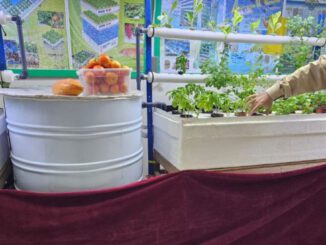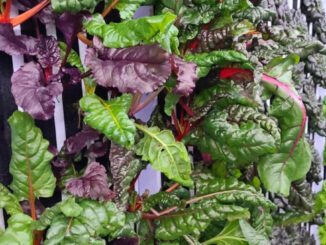
This farm grows produce in the heart of Milwaukee’s central city. It’s expanding.
Hydroponics Micro-Farm Milwaukee | Tom Daykin |
IMAGE: Wes Landry, the Dominican Center hydroponic specialist, explains how the hydroponic growing system works at the Dominican Center
A micro-farm in the heart of Milwaukee’s central city is planning an expansion to bring more fresh produce to one of the city’s poorest neighborhoods − while also training people for urban agricultural jobs.
The farm operates at the nonprofit Dominican Center, which works to revitalize and support the Amani neighborhood − with around 7,000 residents between North 20th and North 30 streets and West North and West Keefe avenues.
The farm’s growth plan is exciting, said Maricha Harris, Dominican Center executive director.
“We have a big vision of what we want to do with urban agriculture,” Harris told the Milwaukee Journal Sentinel.
Dominican Center, 2470 W. Locust St., launched the operation in 2019.
It’s among a growing number of urban farms nationwide. That includes Milwaukee’s central city, where many families regularly face challenges with finding nearby markets that provide fresh greens and vegetables.
“Our goal is to be able to make sure our community can access fresh produce,” Harris said.
Expansion will include aquaponics
Dominican Center’s micro-farm is based on indoor hydroponics growing systems. Hydroponics uses organic fertilizers, LED growing lights and a closed water loop.
The operation initially grew bok choy, a vegetable often used with Chinese cuisine, for a local chef. But the COVID-19 pandemic led to a 2020 shutdown.
The micro-farm resumed operations in 2021.
It now grows collard greens − a staple in Southern cooking −along with okra, bell peppers, tomatoes, cucumbers and basil. Those foods are distributed to Amani residents.
The farm also grows marigolds. The flowers are used for decorative centerpieces at Dominican Center’s annual fundraising dinner, and to help supply flowers for the city-sponsored Bloom and Groom spring plant sale.
The expansion will add growing equipment at Dominican Center, along with an aquaponics system. Aquaponics uses fish waste to help fertilize produce, with the produce helping filter water used to raise fish.
The expanded farm can provide more education and job training for Amani residents, Harris said. She also hopes to see more neighborhood residents do their own growing.
For youth, learning about farming could lead to education and jobs in agriculture, forestry and other fields involving natural resources, said Wes Landry, who oversees Dominican Center’s micro-farm.
“We don’t have many kids of color going into those kinds of education,” Landry said.
A city-funded effort to expand access to health food
Dominican Center’s expansion is being partly financed through a $25,000 grant it recently received from Milwaukee’s Fresh Food Access Fund.
It was among seven city grants, totaling $100,000, for both nonprofit and for-profit organizations working to add healthy food options in underserved neighborhoods. Those organizations must match the grants to obtain the city cash
Dominican Center and Fondy Food Center Inc., which also received $25,000, were the two largest recipients.
Fondy Food Center, a nonprofit group which operates Fondy Farmers Market,plans to buy refrigerated storage containers fort its office at 2102 W. Fond du Lac Ave.
“Access to fresh, nutritious foods is essential for healthy families and children, better educational outcomes, and stronger Milwaukee neighborhoods,” Mayor Cavalier Johnson said, in a statement.
Ald. Khalif Rainey, who led efforts to create the fund, said the grants are “expanding access to healthy food options and promoting healthier lifestyles for residents.”
Federal support promotes urban farming
A 2019 report from the U.S. Department of Agriculture said indoor farming “holds enormous potential” for growing more food for the world’s increasing population while using substantially less water and less space than traditional farming.
The USDA in October announced 52 grants, totaling $14.2 million, to support urban agriculture and innovative production.
Those grants, including one for the Howard‐Suamico School District near Green Bay to grow greens indoors, build on $26.3 million in projects funded since 2020. Up to $7.5 million in additional grants are coming this year.
Dominican Center is ahead of the curve − having launched its farm in 2019, said Shelley Mathews, who owns FullCircle26 Inc. The Milwaukee firm distributes hydroponics equipment manufactured by Taiwan-based Opcom Inc. Dominican Center uses Opcom systems.
Other Milwaukee urban farms have started in recent years − both through indoor systems as well as outdoor community gardens and raised wooden growing beds.
Those include Crops on Top, which uses raised produce beds on what was once a parking lot for a C&D Technologies factory at 830 E. Keefe Ave., in Riverwest; Hundred Acre, which grows fresh greens within a light industrial building at 3945 N. 31st St., in Century City Business Park, and We Got This, a summer gardening program based at 3260 N. Ninth St.
We Got This was a recent Fresh Food Access Fund grant recipient. It will use the $15,500 to help pay for two hoop house systems, as well as 1,000 square feet of raised beds.
Meanwhile, Beyond Organic Corp. is seeking public and private financing for a proposed five-story, 85,000-square-foot building at 716 W. Windlake Ave., just south of West Historic Mitchell Street.
That urban farm would use an aquaponics system to raise fish, shrimp and vegetables. The plans also call for retail, dining and event space as well as classrooms.
To be sure, urban agriculture has its challenges.
The pandemic’s lingering effects have led to funding and staffing issues for Victory Garden Initiative’s annual spring garden blitz.
As a result, the nonprofit group canceled this year’s blitz, in which volunteers build raised garden beds in the backyards of Milwaukee County residents.
Meanwhile, Growing Power Inc. urban farm, at 5500 W. Silver Spring Drive, entered foreclosure in 2017. That site is now home to Ultimate Farm Collaborative Inc.
Harris is optimistic about Dominican Center’s expansion. In addition to serving Amani residents, she sees the potential to generate revenue to support the center’s mission.
“The Wakanda of agriculture,” Harris said, referring to the fictional African nation from the “Black Panther” movies and comics. “That’s our big vision.”
Original Article: https://www.jsonline.com/story/money/real-estate/commercial/2023/07/03/micro-farm-in-milwaukees-central-city-plans-to-expand-grow-jobs/70343923007/



